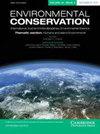捕捞战略决策的权衡和对小型渔业保护的影响
IF 2.6
3区 环境科学与生态学
Q2 BIODIVERSITY CONSERVATION
引用次数: 0
摘要
摘要 人们在心理上倾向于尽量减少损失,即使面对巨大的收益也是如此。这种倾向被称为 "损失规避",在人们面临不确定结果时尤为明显。在小型渔业中,渔民的决策受到货币和非货币资产的影响,探索损失规避如何与保护工作交织在一起,可能有助于了解渔民如何平衡短期和长期优先事项。本研究评估了小规模渔民在信息共享和渔获成功这两种有价值的资产之间进行权衡时,导致损失规避的变量。我们对牙买加 20 个渔场的 78 名渔民进行了结构化问卷调查和假设性简单抽签选择任务。我们发现,当信息共享机会和渔获成功都受到威胁时,渔民的损失厌恶程度略高于仅当渔获成功受到威胁时。在大多数选择集中,无论物质或非物质价值的资产是否受到威胁,交流频率和捕鱼船员的规模都会对渔民的损失厌恶情绪产生重大影响。通过探索渔民选择的驱动因素,我们深入了解了如何通过考虑这些变量来支持渔业保护措施的制定,从而更好地与渔民的决策优先事项保持一致。本文章由计算机程序翻译,如有差异,请以英文原文为准。
Trade-offs in fishing strategy decisions and conservation implications for small-scale fisheries
Summary People are psychologically predisposed to minimize their losses, even in the face of substantial gains. This predisposition, referred to as ‘loss aversion’, is especially present when people face uncertain outcomes. In small-scale fisheries, where fishers’ decisions are influenced by monetary and non-monetary assets, exploring how loss aversion intersects with conservation efforts may offer insights into how fishers balance short-term and long-term priorities. This study assessed the variables that contribute to loss aversion of small-scale fishers when making trade-offs between two valued assets: information-sharing and catch success. We used a structured questionnaire and a hypothetical simple lottery choice task of 78 fishers across 20 fishing beaches in Jamaica. We found that fishers were marginally more loss averse when both information-sharing opportunities and catch success were threatened than when only catch success was threatened. Communication frequency and size of fishing crew contributed significantly to fishers’ loss aversion in most choice sets, regardless of whether materially or non-materially valued assets were threatened. By exploring the drivers underpinning fishers’ choices, we provide insights into how the consideration of these variables can support the development of fisheries conservation measures that better align with the decision priorities of fishers.
求助全文
通过发布文献求助,成功后即可免费获取论文全文。
去求助
来源期刊

Environmental Conservation
环境科学-环境科学
CiteScore
5.20
自引率
3.70%
发文量
43
审稿时长
>36 weeks
期刊介绍:
Environmental Conservation is one of the longest-standing, most highly-cited of the interdisciplinary environmental science journals. It includes research papers, reports, comments, subject reviews, and book reviews addressing environmental policy, practice, and natural and social science of environmental concern at the global level, informed by rigorous local level case studies. The journal"s scope is very broad, including issues in human institutions, ecosystem change, resource utilisation, terrestrial biomes, aquatic systems, and coastal and land use management. Environmental Conservation is essential reading for all environmentalists, managers, consultants, agency workers and scientists wishing to keep abreast of current developments in environmental science.
 求助内容:
求助内容: 应助结果提醒方式:
应助结果提醒方式:


